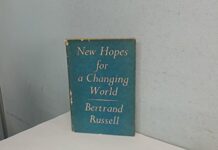
Ebook Info
- Published: 2008
- Number of pages: 108 pages
- Format: PDF
- File Size: 6.23 MB
- Authors: Bertrand Russell
Description
This is a pre-1923 historical reproduction that was curated for quality. Quality assurance was conducted on each of these books in an attempt to remove books with imperfections introduced by the digitization process. Though we have made best efforts – the books may have occasional errors that do not impede the reading experience. We believe this work is culturally important and have elected to bring the book back into print as part of our continuing commitment to the preservation of printed works worldwide.
User’s Reviews
Reviews from Amazon users which were colected at the time this book was published on the website:
⭐This is not a history book. Rather, this book is history. The author wrote what is now a time capsule forever poised on the breaking edge of world events. The year was 1920. The Russian Revolution–despite huge difficulties due to World War I and, following that, attacks from the Western powers–was triumphant. Russell went to Moscow as a huge VIP, a world-famous mathematician/philosopher who believed in Socialism and Communism. Further, he considered capitalism both evil and doomed…And yet, and yet, as we’ll see, Bolshevism was for Russell a step too far.Russell had one of the best minds of the century. Writing this book, he was 48, at the height of his powers. It is altogether delightful to travel through history with a tip-top intelligence. Russell is rigorous, careful, precise, decent, and highly educated. He waltzes gracefully from point to point, fact to fact, deduction to deduction. Remember, he is in the very crucible of history, trying to make sense of events even as they unfold outside his window. I believe an entire college course could be made from this short book. Of course, students would have to read lots of additional material to run along side Russell and evaluate all the arresting things he says, for example: “Bolshevism combines the characteristics of the French Revolution with those of the rise of Islam; and the result is something radically new, which can only be understood by a patient and passionate effort of imagination.”Students taking such a course would understand what so many American intellectuals, all through the 20’s, 30’s, 40’s and 50’s, did not. Blinded by their love of Communism and their hatred of the West, they consistently aided and abetted what was the very definition of an evil government, the USSR under Stalin. Russell’s mind is more subtle and sinuous. He wants a better world but sees that the Bolsheviks are willing to destroy everything to get it; but then it’s not better, it’s only rubble and death. Writing in 1920, when Lenin was in total control and Stalin was a minor figure, Russell nonetheless saw everything that was coming. He dissects the fanaticism, the many ways in which Bolshevism functions as a religion and its adherents become murderous ideologues.Russell writes, with sadness but also alarm: “While some forms of Socialism are immeasurably better than capitalism, others are even worse. Among those that are worse, I reckon the form which is being achieved in Russia, not only in itself, but as a more insuperable barrier to further progress.”Aside: I ordered this book because I knew that Russell spent an hour with Lenin, a figure I wanted to know more about. Russell noted a cruel streak; for example, Lenin “described the division between rich and poor peasants, and the Government propaganda among the latter against the former, leading to acts of violence which he seemed to find amusing.” This at a time when the country could not feed itself! I’m intrigued by cold-hearted intellectuals who think nothing of leveling what civilization there is in order to build their brave new worlds. Let us never forget Pol Pot who went back to Cambodia and killed 25% of his own country. In the field I mostly write about, education, there’s our own John Dewey, who set out to dumb down an entire country so he could build his version of socialism. Lenin was a tough guy relative to the professorial Dewey, but I detect the same megalomania in both men.
⭐I thoroughly enjoyed this book. It deserves one star because many readers lack the exposure to see how wrong he was without wiser thinkers like Ludwig von Mises (Socialism: An Economic and Sociological Analysis), and F.A. Hayek (The Road to Serfdom). Not only has history vindicated LvM and repudiated Russell’s economic assertions, but LvM wrote justified assertions during these years when Russel “arrived in Russia a communist,” only to produce this account.Revealing: Russel’s inability to appreciate the USA, even for its art and creativity. He lacks the next level of intellect to understand the arts applied in pastoral settings, within the home, on the prospecting trails, in martial affairs, and in engineering systems. He expects art to reside exclusively in marble and oil, and on stage ala European civilization.Revealing: A predictable criticism of communism by a democratic socialist, ultimately concluding that syndicalism is the answer to the “evils” of capitalism. A visit to Russia was unnecessary to produce such assertions.Revealing: Asserting that the erosion of industry must occur under communism without the wisdom of LvM explaining that the presumption of static conditions by planners is the genesis of that erosion (and is common to all forms of socialism).Ultimately Russel cannot hold ground against wiser men who predicted World War 2, while men like him impelled the world towards war via disarmament and pacifism upon the defenders, clearing the path for the aggressors. His half-true criticisms of the Bolsheviks are tainted by his own political (democratic socialism) and religious (secular humanism) biases.I enjoyed the read for increased nuance in the opposing views of the times – especially considering the looming conflict between various brands of socialism in Germany that preempted the rise of Hitler’s National Socialism with the SPD routed and August Bebel in flight. Russel’s understanding of the allure of nationalism is one of his brilliant prognostications here. I couldn’t imagine a more intelligent representation of the opinion conflicts between communists and democratic socialists of his day.If the historical fallacies were well-known, the book would get five stars. Because it will act to perpetuate wrong narratives like “communism is just the wrong form of socialism, but its goals are noble,” it deserves one star. Reader beware. Synthesize this book with LvM’s Socialism: An Economic and Sociological Analysis. LvM provides volumes of logic and evidence. Russel doesn’t even try to refute LvM, he simply slanders him as a “capitalist propagandist.” I love Russel’s brilliant mind. I am persistently amazed at how he misused it.
⭐Russell’s sympathetic yet critical view of Bolshevism and the Russian revolution is clear and concise. He approaches early Russian Communism as a skeptic, analyzing what the success of Bolshevism would actually achieve, and whether the methods employed by the Bolsheviks are likely to lead to those ends. He attacks fanaticism, but is understanding of the harsh circumstances that threatened to undo the revolution. Augmented by descriptions of his meetings with key participants such as Lenin and Trotsky, this treatise is a must read for skeptics, political theorists and historians alike.
⭐An excellent description of the state of Communism in Russia while Lenin was still alive. Russell, who was himself a communist, travelled to Russia and saw first-hand both the successes and failures off the October Revolution. It’s clear from reading this book that Bolshevism is not the only firm of Communism, and Russell makes it clear why Bolshevism is unworkable in the advanced capitalist countries.
⭐An easy read, but the author is clearly a wide-eyed utopian destined for disappointment. He has no clue what self-government really means. Also, he repeatedly confuses Russians with Bolsheviks. This was not a Russian revolution, but one of very hostile minorities against Russia. It’s too bad that the majority of ignoramus’ today lay the blame of communism on Russia, who suffered the most from it.
⭐Interesting read even after all these years.
⭐This book helps to understand capitalism, communism and socialism.
⭐Among religions, Bolshevism is to be reckoned with Mohammedanism rather than with Christianity and Buddhism……Mohammedanism and Bolshevism are practical, social, unspiritual, concerned to win the empire of this world’Leaving aside the empire building Crusades and the mystical Sufis, the above seems extraordinarily relevant today. Bertrand Russell wrote this book in 1920,after a visit to Russia as part of an official British Labour Party delegation.For the next 70 years Soviet Empire building was a central theme in global politics. In 1920 Islam was politically at its lowest ebb. It has since replaced militant Marxism as a major threat to world peace.Russell’s prescience, detailed observation and careful analysis illumines every page of this book. In 1920, after the horrors of World War, many commentators worldwide, and not simply socialist sympathisers, were anxious to see Lenin’s Russia as a beacon of hope for a new world which would be more just than the old Empires which had led Europe to disaster.Despite a royal reception and lavish hospitality, Russell took every opportunity to talk to ordinary Russians. He soon noticed the complete disconnect between real working people and the ‘class conscious proletarians’ of Marxist theory. Another memorable quote:’By proclaiming itself the friend of the proletarian, the Government has been enabled to establish an iron discipline, beyond the wildest dreams of the most autocratic American magnate.’This book should be required reading for anyone who still imagines that Marxism was a good idea that became corrupted under the tyranny of Stalin. Russell spent an hour of his visit talking to Lenin and described him as an intellectual aristocrat. He was enslaved to the theories of Marx, which theories assume that materialist acquisitiveness is not simply man’s ruling passion, but the only passion that a political leader needs to understand. Workers and peasants could not be expected to understand, but must be forced to behave according to Marx’s theories.’The dogmatic character of Marxian communism finds support in the supposed philosophic basis of the doctrine; it has the fixed certainty of Catholic theology, not the fluidity and sceptical practicality of modern science’.To read all the best quotes, read the whole book. There is something memorable on almost every one of its 96 pages.The dictatorship, which was to permeate every aspect of Soviet life, was already well developed in 1920. It seems extraordinary that, as late as the 1980s, Arthur Scargill and other members of the Old Left in the UK still regarded Soviet Communism as a model system. Russell, unlike many of his contemporary socialists, was neither surprised nor dismayed that a Marxist state became a rigid, stultifying, totalitarian regime. Putting Marxism into practice could have no other result.
Keywords
Free Download The Practice and Theory of Bolshevism in PDF format
The Practice and Theory of Bolshevism PDF Free Download
Download The Practice and Theory of Bolshevism 2008 PDF Free
The Practice and Theory of Bolshevism 2008 PDF Free Download
Download The Practice and Theory of Bolshevism PDF
Free Download Ebook The Practice and Theory of Bolshevism





